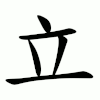立
See also: ᇁ
| ||||||||
| ||||||||
| ||||||||
Translingual
| Stroke order | |||
|---|---|---|---|
 | |||
Han character
立 (Kangxi radical 117, 立+0, 5 strokes, cangjie input 卜廿 (YT), four-corner 00108, composition ⿱亠䒑)
- Kangxi radical #117, ⽴.
Derived characters
Related characters
References
- KangXi: page 870, character 17
- Dai Kanwa Jiten: character 25721
- Dae Jaweon: page 1299, character 18
- Hanyu Da Zidian (first edition): volume 4, page 2706, character 1
- Unihan data for U+7ACB
- Unihan data for U+F9F7
Chinese
| simp. and trad. |
立 | |
|---|---|---|
| alternative forms | 𡗓 | |
Glyph origin
| Historical forms of the character 立 | ||
|---|---|---|
| Shang | Western Zhou | Shuowen Jiezi (compiled in Han) |
| Oracle bone script | Bronze inscriptions | Small seal script |
 |
 |
 |
Characters in the same phonetic series (立) (Zhengzhang, 2003)
Pictogram (象形) – a person standing on the ground; compare 大.
Etymology 1
From Proto-Sino-Tibetan *g-r(j)ap (“to stand”). Cognate with 位 (OC *ɢʷrɯbs).
Pronunciation
Definitions
立
- to stand
- to erect
- to set up; to establish
- to institute; to lay down; to draw up; to compose (legal document)
- to exist; to live
- standing
- to place on the throne; to take the throne
- upright; vertical
- immediately; at once
Synonyms
Dialectal synonyms of 站 (“to stand”) [map]
Compounds
Derived terms from 立
|
|
|
Pronunciation
Japanese
Readings
Pronunciation
- IPA(key): [ɾʲit͡sɨᵝ]
Derived terms
Derived terms
- 立位 (ritsui, “standing sex position”)
- 立脚 (rikkyaku)
- 立憲 (rikken)
- 立候補 (rikkōho)
- 立秋 (risshun)
- 立体 (rittai, “a solid (shape) (geometry)”)
- 立派 (rippa, “splendor”)
- 立春 (risshun)
- 立証 (risshō)
- 立夏 (rikka, “first day of summer”)
- 立冬 (rittō)
- 立腹 (rippuku)
- 立方 (rippō, “the third power of a number, cube”)
- 立方体 (rippōtai, “cube (geometric object)”)
- 立法 (rippō)
- 立礼 (ritsurei)
- 孤立 (koritsu, “isolation”)
Korean
Etymology
From Middle Chinese 立 (MC liɪp̚). Recorded as Middle Korean 립〮 (líp) (Yale: líp) in Hunmong Jahoe (訓蒙字會 / 훈몽자회), 1527.
Pronunciation
- (SK Standard/Seoul) IPA(key): [ɾip̚] ~ [ip̚]
- Phonetic hangul: [립/입]
Compounds
Compounds
- 입방/립방 (立方, ipbang/ripbang)
- 입법/립법 (立法, ipbeop/ripbeop)
- 입장/립장 (立場, ipjang/ripjang)
- 입증/립증 (立證, ipjeung/ripjeung)
- 입춘/립춘 (立春, ipchun/ripchun)
- 입헌/립헌 (立憲, ipheon/ripheon)
- 건립 (建立, geollip)
- 고립 (孤立, gorip)
- 국립 (國立, gungnip)
- 대립 (對立, daerip)
- 독립 (獨立, dongnip)
- 사립 (私立, sarip)
- 설립 (設立, seollip)
- 성립 (成立, seongnip)
- 수립 (樹立, surip)
- 연립 (聯立, yeollip)
- 자립 (自立, jarip)
- 정립 (定立, jeongnip)
- 조립 (組立, jorip)
- 중립 (中立, jungnip)
- 확립 (確立, hwangnip)
- 폐가입진 (廢假立眞, pyegaipjin)
Vietnamese
This article is issued from Wiktionary. The text is licensed under Creative Commons - Attribution - Sharealike. Additional terms may apply for the media files.